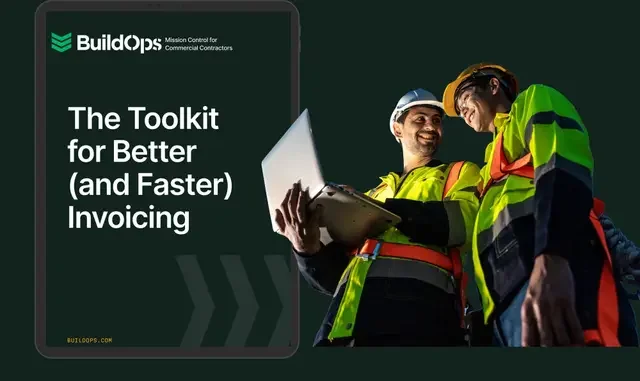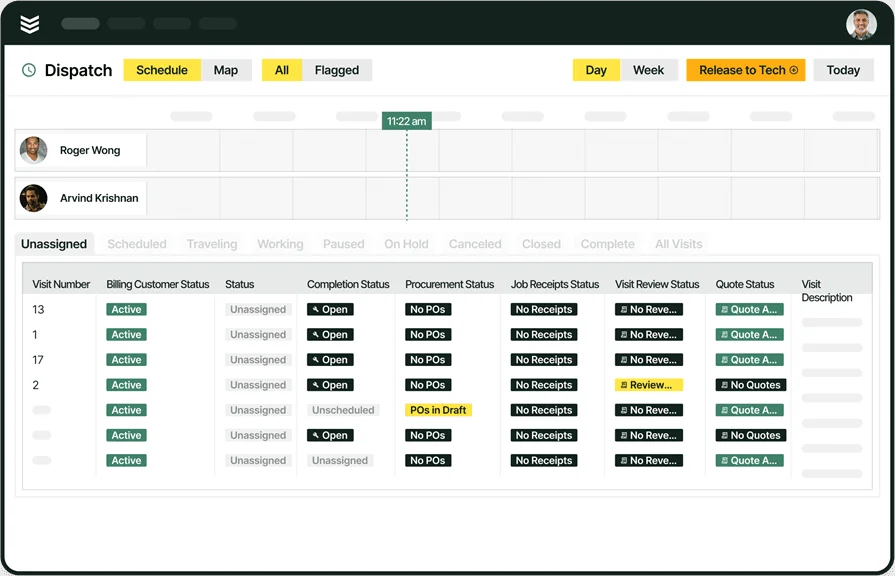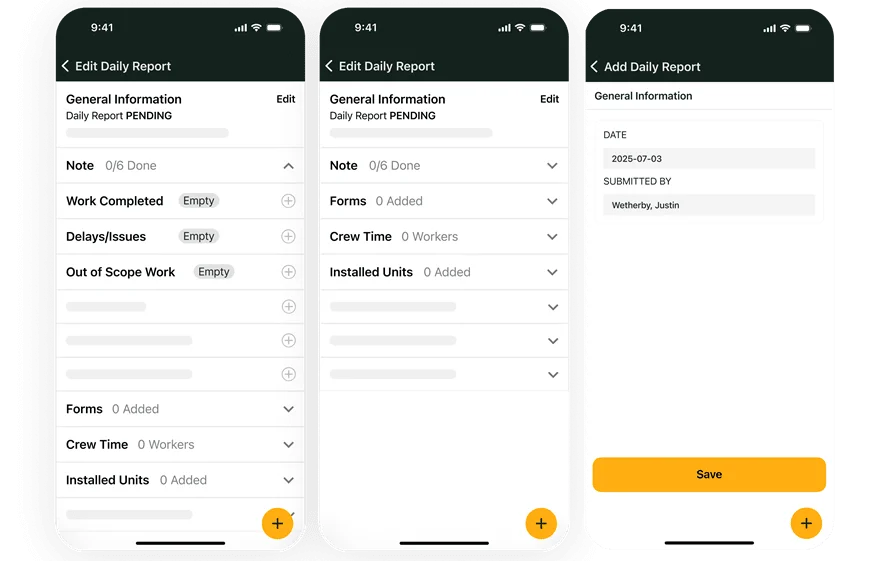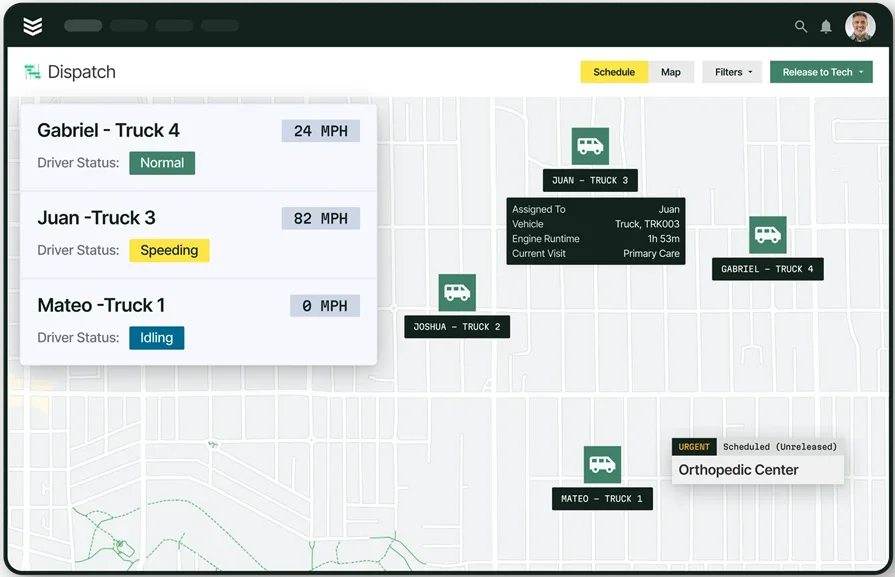You’ve got crews on-site, tools in transit, and a dozen moving parts across three job sites—and that’s just before lunch. Managing construction work in the field takes more than clipboards and phone calls. That’s why every sharp contractor uses a construction app to stay on top of it all.
Whether you're juggling punch lists, tracking deliveries, or making sure the crew has the right specs, the best construction apps help you cut through the noise and keep jobs on track. No more chasing down updates. No more waiting for answers. With the right tool in your pocket, your field team gets what they need—right when they need it.
Construction field service management platforms connect your scheduling, dispatch, and job tracking in one place. And a solid construction app builds on that foundation to help crews work faster, with fewer setbacks and less guesswork. Here’s what this guide covers:
- How to choose the best construction app for your field crews
- Key construction app features to look for and evaluate based on app type
- 10 best construction apps for contractors, project managers, and field teams
- 5 benefits of using construction apps on your job sites
- 4 important FAQs about construction industry apps—answered
Too many apps are clunky, slow, or built for office work—not job sites. You need an app that fits the way your crews actually work—on concrete, under pressure, and in real-time. Let’s dig into how to find a construction app that’s ready for the field.
How to choose the best construction app for your field crews
Choosing a construction app goes beyond picking the one with the highest reviews or flashiest interface. Field crews need something that works the way they work—fast, tough, and on-site. Whether your team is handling equipment installs, daily punch lists, or multiple job sites at once, the app they carry in their pocket matters.
The best construction apps are built to handle dirt, delays, and day-to-day pressure. They help crews log updates, access job info, and stay connected without bouncing between too many tools. Before locking one in, here’s what to look for:
- Ease of use in the field – Can your team quickly input updates while wearing gloves? Does it let them check task status or site progress without digging through layers of menus? Is it simple enough for every crew member to use without constant training?
- Offline access – Can the app function when there’s no signal on-site? Will it sync job notes, uploads, and checklists automatically once service returns? Does it allow field updates even in remote or enclosed areas?
- Tool and platform integration – Does it connect with scheduling software, inventory systems, or time tracking tools? Can your crew complete tasks in one place instead of jumping between different platforms? Will it eliminate double entry and reduce missed updates?
- Built for mobile first – Was this app designed for phones and tablets used on job sites—or just shrunk down from a desktop platform? Does it run smoothly in the field without crashing or freezing? Can techs move through the app with speed when things get busy?
- Features – Can the app manage job assignments, track labor hours, send work orders, and store photos or blueprints? Does it support live updates, team messaging, and progress logs? Will it actually help the crew get through their day faster, with fewer mistakes?
The best construction apps match the pace and pressure of the job site. They give your team the tools to stay productive from the moment they arrive until the last task wraps up. Next, we’ll break down which features matter most when comparing construction industry apps built for field service work.
Key construction app features to look for and evaluate based on app type
Construction crews rely on different tools depending on the work. One team might need detailed estimates ready in minutes, while another needs job updates and time logs from the field. The best construction apps are broken into clear categories—each with features that support real-world job site conditions, crew coordination, and fast decision-making.
Below, we’ve outlined the four main types of construction industry apps and the core features that matter most in the field.
Field service management apps
These are the backbone of day-to-day field operations. Field service apps help teams manage job schedules, dispatch crews, log work hours, and track equipment in real time—all without heading back to the office.
- Live job scheduling – Crews receive updated job assignments as soon as dispatch makes a change, keeping projects moving without delay. This level of coordination is made possible with platforms like BuildOps construction scheduling software.
- Centralized dispatch board – Dispatchers get a full view of open jobs, technician availability, and overlapping appointments. The visual board lets them make fast adjustments from a single screen, powered by construction dispatch software.
- Field time tracking – Job hours are logged straight from the field, automatically tying time to each work order and reducing admin work. Time tracking tools built for field teams simplify payroll and improve labor accuracy.
- Fleet tracking and routing – Truck locations are updated in real time, helping teams reduce idle time and coordinate arrival windows. Tools like fleet tracking software help manage vehicle activity across active jobs.
CRM apps
Customer-focused construction apps store client details, past job history, and billing records. These tools help field teams deliver better service by giving them what they need before they even show up on-site.
- Client and job history access – Crews pull up site notes, work orders, and service details before stepping on the property. This capability is part of robust construction CRM software that puts customer records in the field team’s hands.
- Field invoicing – Invoices can be created and sent directly from the job site, speeding up cash flow and cutting down office paperwork. Invoicing features let techs close out jobs the moment they’re done.
- Contract and service tracking – Ongoing maintenance work is tied to long-term agreements, with upcoming visits automatically scheduled. Service agreement tools keep recurring jobs on track without manual reminders.
- On-site payment processing – Customers can pay the moment the work is done using mobile payment options. Payment tools reduce billing delays and improve the customer experience.
Estimating apps
Estimating apps give crews and sales teams a fast way to build job quotes, track proposals, and turn approvals into work orders—all while in the field.
- Quote-to-job conversion – Once approved, estimates become active jobs with zero data re-entry. This seamless handoff is made possible with construction quoting tools that link proposals directly to project schedules.
- Flexible line-item creation – Users build out estimates with labor, materials, and markups in just a few taps. Pipeline management tools let teams manage all stages from lead to signed contract.
- Proposal tracking and visibility – Field and sales teams know when quotes are opened, viewed, or approved—keeping follow-ups tight and opportunities from slipping through the cracks.
- Mobile-friendly estimate building – Quotes can be created on-site, with pricing, scope, and scope-specific notes added directly from the field.
Project management apps
These tools keep jobs running on time and on budget. Project management apps give teams full visibility into job progress, asset usage, and upcoming tasks—without needing a laptop or office access.
- Progress reporting – Field updates flow into real-time dashboards for cost tracking, productivity analysis, and milestone visibility. Reporting tools help leadership teams act quickly when things go off course.
- Work order status updates – Job completion, material needs, and technician notes are logged from the field. Integrated work order management systems streamline task handoffs between field and office.
- Asset tracking on job sites – Equipment is assigned to jobs, with location, usage time, and maintenance status logged automatically. Field service asset management tools help prevent costly equipment downtime.
- Multi-site job visibility – Project managers view multiple locations from a central dashboard, helping them stay ahead of delays, changes, or site-specific issues.

Always get paid on time
Find out how to perfect your invoicing efforts so you get paid faster.
Each app for construction plays a different role—but when chosen wisely, they work together to support faster job cycles, cleaner reporting, and fewer dropped tasks. In the next section, we’ll highlight the best construction apps that field crews actually use to get the work done.
10 best construction apps for contractors, project managers, and field teams
Construction today runs on more than tools and trucks—it runs on data, speed, and coordination. Whether you're a contractor dispatching crews, a project manager tracking job costs, or a field tech logging work orders, the construction app you use can either slow things down or make the whole day easier.
This list highlights the best construction industry apps across four key categories: field service management, CRM, estimating, and project management. Each one helps field teams work faster, stay informed, and deliver better results—with some built for niche needs and others built to handle it all.
Field service management apps
Managing work in the field takes a lot more than clipboards and phone calls. These apps help contractors handle dispatching, scheduling, mobile time tracking, and job updates—right from the field.
1. BuildOps
BuildOps is built specifically for commercial contractors who need tight control over field service operations. It connects dispatchers, office staff, and techs through real-time job updates, mobile scheduling, and AI-powered note-taking. Crews log job progress, update statuses, and access everything from work orders to customer history—all in one place.
Industry Specialization: Commercial
How Pricing Works: Subscription-based, per technician, with custom pricing
What Sets It Apart: Built for commercial field teams with AI note capture, mobile job tracking, and real-time scheduling
Key Features:
- Live dispatch and real-time job updates
- Mobile work order tracking and sync
- AI-powered reporting assistance

Explore BuildOps construction tools
See how we help construction pros empower field techs to get work done.
2. Housecall Pro
Image Source: Housecall Pro
Housecall Pro is a mobile-first platform designed to help small to mid-sized contractors manage job schedules, invoicing, and basic dispatching. It’s known for its clean interface and simplicity, especially for residential remodeling and home construction. However, it lacks the depth needed for more complex commercial jobs or multi-crew scheduling.
Industry Specialization: Residential contractors
How Pricing Works: Monthly per-user plans, tiered by features
What Sets It Apart: Straightforward UI for small contractors managing basic job workflows
Key Features:
- Simple job scheduling and dispatch
- Customer notifications and on-the-go invoicing
- Estimate and payment tracking
3. Jobber
Image Source: Jobber
Jobber serves small construction teams with essential features like job tracking, estimates, and scheduling tools. It’s ideal for residential service contractors needing a centralized tool for invoicing and task management. Its limitations show when teams grow or need custom workflows and integration across multiple departments.
Industry Specialization: Residential and home service contractors
How Pricing Works: Subscription-based, per user
What Sets It Apart: Basic all-in-one toolkit for small businesses in construction services
Key Features:
- Visual calendar-based job management
- Field invoice generation
- Quote approval workflows
CRM features
Customer relationship management apps let your crew track project history, client data, job documents, and even contracts. These tools are all about keeping your team organized before, during, and after a job.
4. Pipeline CRM
Image Source: Pipeline CRM
Pipeline CRM focuses on construction sales pipelines and client management. It lets sales reps and contractors track leads, communication, and bid progress through a single platform. While useful for sales-driven teams, it doesn’t support deep service operations or field team coordination.
Industry Specialization: Sales and preconstruction
How Pricing Works: Tiered monthly plans based on users
What Sets It Apart: Streamlined sales pipeline tracking for construction bidding
Key Features:
- Lead tracking and status workflows
- Email sync and communication logs
- Pipeline analytics
5. Buildr
Image Source: Buildr
Buildr combines basic CRM tools with construction-specific features for preconstruction workflows. Contractors can manage bids, clients, and simple contact records in one place. However, it doesn’t offer much in the way of mobile service tools or job-site coordination.
Industry Specialization: Preconstruction teams and GC sales
How Pricing Works: Custom pricing based on business size
What Sets It Apart: CRM with preconstruction functionality focused on tracking proposals and bid timelines
Key Features:
- Bid tracking
- Contact management and team notes
- Client database with tagging filters
6. Buildertrend CRM
Image Source: Buildertrend
Buildertrend offers CRM functionality alongside its broader project management suite. It’s designed to help contractors manage customer communication from first contact through final punch list. However, the CRM side can feel bulky when used as a standalone customer tracking tool.
Industry Specialization: Residential construction
How Pricing Works: Monthly plans with CRM bundled into project management suite
What Sets It Apart: Combines lead tracking and communication with project visibility
Key Features:
- Customer portal access
- Lead status updates and communication logs
- Proposal and estimate integration
Estimating features
Estimating tools allow contractors to build accurate proposals fast—without leaving the field. These construction apps help crews turn scope into pricing and pricing into signed work. Additionally, they can help manage budgets and track expenses throughout the project lifecycle.
7. BuildingConnected by Autodesk
Image Source: Autodesk Build
BuildingConnected is made for managing large-scale bids and subcontractor workflows. It’s built for GCs who need transparency across proposals and bid documents. It’s not a fit for smaller teams that just need fast estimates or mobile quoting in the field.
Industry Specialization: General contractors and commercial builders
How Pricing Works: Custom quotes based on team size
What Sets It Apart: End-to-end bid management system with communication tracking
Key Features:
- Bid invitations and package distribution
- Subcontractor tracking
- Proposal management
8. SmartBid
Image Source: SmartBid
SmartBid focuses on subcontractor bid management, allowing GCs to send invites, manage responses, and organize all pre-bid communication. It’s efficient for preconstruction but lacks estimating tools for field teams or self-performing contractors.
Industry Specialization: Commercial construction
How Pricing Works: Annual pricing with licensing tiers
What Sets It Apart: Strong subcontractor prequalification and bid distribution tools
Key Features:
- Secure subcontractor portal
- Document version tracking
- Prequalification forms
Project management
From scheduling to punch lists to document storage, project management apps keep crews, supervisors, and PMs aligned on job status and deliverables. It streamlines workflows, enhance communication, and provide real-time insights into project progress, ultimately boosting efficiency and reducing errors on construction sites.
9. Procore
Image Source: Procore
Procore is one of the most widely-used project management tools in construction. It connects field and office teams with everything from drawing logs to RFIs and submittals. While comprehensive, it can be overwhelming and costly for smaller contractors or those needing only a handful of features.
Industry Specialization: Mid-size to large general contractors
How Pricing Works: Custom pricing based on modules and company size
What Sets It Apart: Enterprise-level tools for large-scale project tracking
Key Features:
- RFI, submittal, and spec tracking
- Budget and cost control dashboards
- Document control and punch list tools
10. Zoho Projects (Construction Edition)
Image Source: Zoho
Zoho Projects offers basic project management tools adapted for construction workflows. It supports scheduling, task tracking, and milestone planning. While flexible, it lacks field-specific features and doesn’t offer deep integration with service dispatch or asset management.
Industry Specialization: Broad industry use with construction-specific templates
How Pricing Works: Monthly pricing by user
What Sets It Apart: Easy-to-use interface with construction task templates
Key Features:
- Task creation and milestone tracking
- Gantt chart project views
- Team chat and file sharing

Equip your techs for construction
Access job information instantly to keep projects running smoothly.
5 benefits of using construction apps on your job sites
A strong construction app doesn’t just replace paperwork—it changes how jobs get done. Crews stay better informed, office teams get cleaner data, and everyone moves quicker. When the tools in your field teams’ hands are built to match the pace and pressure of the work, the results show up in fewer mistakes, tighter coordination, and faster turnarounds.
1. Faster decisions and fewer delays
Crews don’t have time to wait for emails or hunt down updates. A construction app built for the field gives them instant access to schedules, job notes, and task changes. With construction field service management software, every update flows between dispatch and field teams in real time, helping jobs move forward without slowdowns.
2. Stronger crew coordination
When teams shift between sites or jobs stack up, knowing who’s assigned where makes the difference. A good app for construction tracks active jobs, assigned techs, and work progress without the guesswork. Apps that integrate with construction crew scheduling tools help field leaders adjust assignments and keep everyone in sync, even on the fly.
3. Clearer job tracking and performance data
With the right tools, contractors don’t just finish jobs—they learn from them. The best construction apps log time, materials, and job milestones in the background, making it easier to measure team output. Paired with construction project management software for contractors, field data turns into real insights that help tighten timelines and improve results over time.
4. Better client communication
A reliable app helps field teams see service history, past quotes, and current job details all in one place. When the customer calls, answers are immediate. Using a CRM for construction, contractors can keep client info organized and accessible—making follow-ups, billing, and job history easier to manage.
5. Less paperwork, fewer errors
When crews can log work from the jobsite, there’s no re-entering notes at the end of the day. Photos, signatures, and time entries are attached to each job in real time. This reduces missed details and removes the need for double entry back at the office—letting your team focus on the work instead of the paperwork.
4 important FAQs about construction industry apps—answered
Construction crews rely on tools that work as hard as they do—on site, in the truck, and back at the office. When it comes to choosing the best construction apps, it’s not just about features—it’s about how those features actually support the way your team works. Whether you're dispatching, estimating, or closing out a job, knowing what to expect from a construction app helps your team avoid downtime and move with purpose.
1. What is a construction app for contractors?
A construction app helps contractors manage jobs, schedule crews, track progress, and keep everyone connected—from the office to the field. It brings dispatch, estimates, time tracking, and jobsite updates into one platform construction crews can use in real time, right from their phones or tablets.
The best construction apps keep projects moving without the hassle of paperwork or endless back-and-forth. They give teams the tools to log hours, access job specs, upload photos, and complete tasks—all while staying synced with office staff and customers. Whether you're managing a single crew or multiple sites, the app keeps the work flowing.
2. How do construction apps work?
Construction industry apps function as a digital control center for your entire operation—connecting field crews, office staff, and customers. Depending on the app, they can:
- Send real-time job updates with task details, timelines, and notes
- Track mobile time punches, job progress, and photos from the field
- Sync with tools like scheduling, invoicing, CRM, and project management software
- Centralize data so crews and managers all have the same job view
This setup keeps everyone aligned, reduces paperwork, and helps teams react faster when priorities shift.
3. Who benefits the most from construction apps?
Construction apps are valuable for the whole team, from the jobsite to the office:
- Field Technicians – Access live job updates, checklists, punch items, and attach photos from the field
- Superintendents & Foremen – Track labor across jobsites and adjust schedules on the move
- Project Managers – Monitor timelines, log change orders, and view progress reports in real time
- Estimators – Create and manage quotes, track bid approvals, and sync estimates with job schedules
- Dispatch Teams – Assign crews based on skill, availability, and job priority
- Executives – Get insight into job profitability, labor costs, and jobsite productivity trends
- Administrators – Handle invoicing, payment collection, and customer communication faster
- Sales Teams – Log leads, create quotes, and track deal stages from preconstruction to handoff
- Subcontractor Coordinators – Track third-party progress, manage paperwork, and confirm site access
- Back Office Teams – Sync hours, materials, and job status across departments with fewer errors
Whether you’re running a crew of 5 or 50, having the best construction app can change the way you run jobs from start to finish.
4. What are best practices when using construction apps on the job?
Once your team is using a construction app, these practices help you get the most value out of it:
- Assign one lead per crew to own job updates and task completions
- Make sure all job notes and photos are added in the app, not on paper
- Use scheduling tools to assign work by skill level and priority
- Keep CRM and customer info updated to speed up approvals and closeouts
- Sync time tracking directly to payroll or invoicing to avoid manual entry
- Build reusable quote templates for faster estimating
- Capture field data daily—don’t wait until the job is done
- Train teams on how to use app features specific to their role
- Use reporting to track progress across sites and crews
- Regularly review feedback from the field to improve workflows
Adopting the best construction apps is just the first step—what makes them effective is how your team uses them day in and day out.
Construction work doesn’t leave room for guesswork. Every delay, missed update, or misplaced note adds up—and field teams feel it first. That’s why using the best construction apps isn’t just about going digital; it’s about choosing tools that actually match the way your crews build, install, and deliver on-site. Whether you're managing one crew or coordinating across multiple jobs, having a system that fits how your team works is what makes the difference.
For commercial contractors especially, using a collection of standalone apps can slow you down just as much as paper. An all-in-one platform built specifically for commercial field service gives you control over dispatch, quoting, job tracking, and invoicing—without the patchwork. That’s where a solution like BuildOps fits in, built to run everything your field and office teams need from one place.

Curious to see how it works?
See how we help teams manage field service teams to ensure jobs stay on track.







